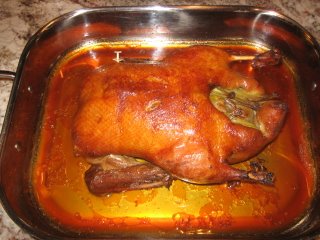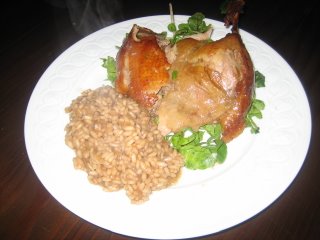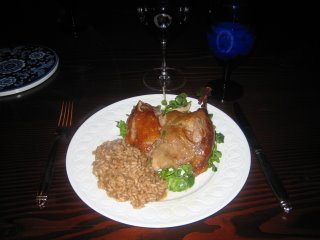Julie: Ginger Braised Duck
Our downstairs has been perfumed with the heady smell of duck for almost a week now, and I have to say, it is wonderful. I loved how this duck became the basis for several meals over the course of the week-- we had the duck itself, I used some of the "broth" (which was more like a demi-glace for me) and the leftover meat for duck risotto, and then I used the rest of the "broth" for the pasta dish Amanda talks about in the introductory paragraph. All ended up really delicious, but definitely not light. I'm ready to eat only salad and vegetable soup for a couple days just to detox!

Day 1: braising the duck. I have to say I was intimidated as this was my first whole duck. But braising it was incredibly easy. The only challenge I had was temperature regulation. My low setting on the gas range was a little too high, not the lazy fizzing she recommends, and my extra low setting (where it goes intermittently on and off) was too low. So I think I need to either get one of those flame tamers, or as Jer recommended earlier, do it in the oven rather than the stovetop. The advantage of the stovetop was it was easy to get to it to check it and flip it, but I think next time, it will be the oven for me. After it braised, I put the bird on a roasting pan and just stuck that and the pot with all the liquids in the fridge.

Day 2: roasting the duck. Again, really easy. I followed her directions exactly. The only exception I made was that I saved the duck fat from the top of the broth (there was a lot of it!) as I thought for the pasta and rice dishes I was eyeing to make, the duck fat would make a nice substitute for the butter. (it did!) I roasted the birdy as she recommended, and it got beautiful. So delicious looking.

As it roasted, I was going to make the rice with duck broth she recommended, only to realize I was out of long grain rice. However, I noticed I had a box of arborio. So I improvised and make duck broth risotto, and I have to say, it came out utterly delicious. I sauteed some onions in a little of the duck fat, then added the rice to toast a bit, then slowly added about a cup and a half of the duck broth, some chicken broth, and a bit of red wine. It came out so savory and delicious-- probably too rich a side dish to the duck in normal circumstances, but I knew it would be delicious the next day with duck meat stirred in. I have to say the duck broth made a huge impact on the risotto-- on that note, while braising I put in a bit less water then Amanda recommends, instead covering the duck only 1/3 of the way, as Molly Steven's recommends in her "All About Braising". So my broth was concentrated and more like a demi-glace, gelatinous and thick. But I was quite happy about this, as the flavor was intensely concentrated and a cup went a long way!

The duck itself came out well, though I can't say the meat was quite a falling off the bone as she described, perhaps because I couldn't get the braise to stay at exactly the right temp. But the meat was moist and flavorful so I couldn't complain. The skin looked great, but I think something went amuck somewhere, as there was still quite a bit of fat attached to it... again, perhaps because of the braise not being quite right, or perhaps I pulled it out of the oven too soon. I am not a big "straight fat" eater, so I couldn't bring myself to eat the skin that had the fat attached, but the parts that didn't were delish. Seeing all the skin leftover I had the idea to try and salvage it. So I decided to try and cook it like bacon, and took the leftover skin and roasted it in the oven to render the fat. What remained was like "duck bacon" or pork rinds. I haven't used it yet, but maybe chopped up small in a salad, like duck bacon bits?
Day 3: leftovers of duck stirred into the risotto. Delish!
Day 4: I made the pasta sauce she recommended and served it over fettucine. Took a little duck fat and made a roux, sauteeing it with flour. Added the rest of the duck "broth", about a cup. Then added some cream, some lowfat milk (couldn't do a cup of straight cream, just sounded too rich) , some sliced mushrooms and some cooked turkey meat I had frozen from my last turkey soup batch. The sauce came together quickly and was creamy and so flavorful from the duck broth. The depth and complexity of the flavor was wonderful, but not too "ducky" which was good, considering we'd had duck twice already this week. It made a truly wonderful pasta sauce, and served with a green salad and some blanched broccoli, was a great meal.
So overall, this bird went a LONG way! I would happily repeat this recipe for company, as it was impressive, delicious and quite easy. As a regular staple though, it wouldn't be so good for our waistlines!

3 Comments:
Jul, this all looks wonderful and I really love all the detailed descriptions. All of the follow-on dishes sounded amazing, in particular the creamy pasta sauce.
I've been going back and forth with this recipe -- do I make it on the stove with water the way she has in her book or do I braise it using a more classic method with some broth, wine and mireproix in the oven on a low temp. And do I leave it in the braising liquid to cool or take it out of the liquid the way she describes for roasting the next day. Yes, these are the sorts of things that keep me up at night.
What do you think given your experience with the dish? Also, did you stick with the asian flavors in the recipe or did you migrate towards more french-based seasonings? Also, did you use moulard, muscovy, or pekin?
We're in Argentina until mid next week and then New York so I won't be able to make it until the week of the 23rd but am really looking forward to it. Pete isn't a duck fan so I need to find a night when I'm cooking for Rachy or Nelson.
Lucky Rachy or Nelson! Enjoy Argentina, hope you are having a great time!!! And eating lots of dulce de leche!
In terms of the initial braise, I used water and stuffed the mirepoix into the bird, as she suggested, and I was impressed at how incredibly flavorful the end broth was. I'm guessing the more traditional way would be lovely too, but I was lazy and it worked out very well. In terms of cooling, I too was in a dilemma on this front. I compromised (with myself!) and let the duck cool all the way to room temp in the liquid, and then only seperated it to put it in the fridge. If you fridge'd it in the broth, the meat might absorb more of the juice back, but the catch would be that the significant layer of fat that solidified on the liquid would now be on the duck, and harder to take off then just spooning it off a bowl.
I stuck with the recipe as it was, as it was my first full duck and I didn't know what I didn't know. I have to say the flavors weren't overly strong, but a nice background note. I liked them though. When the butcher asked me which duck to choose, I had no clue, and guessed the Pekin. However, when I got home and looked it up, I found a recommendation to use muscovy for braising or roasting as it was more meaty, so next time I'll do that. But the Pekin came out fine, plenty of meat for Chris and I for 4 meals. However, the last 2 were more duck scraps, so I do think if I was serving 4 the initial night, I'd either go for a meatier bird, or make 2.
Good luck and enjoy!
sounds truly amazing julie!!! i loved, loved, loved reading your entry and can't wait to finish up the cooking (braised yesterday, am roasting today) and compare notes with your experience. also v. impressed with all the wonderful meals you've made afterwards!
jer - i purchase a muscovy duck, if you're interested...
Post a Comment
<< Home